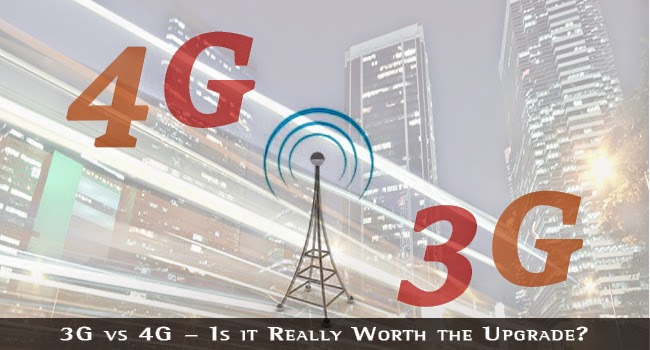What are the major differences between 3G & 4G internet?
As
you would expect, 4G is the fourth generation of mobile internet
technology. Putting aside arguments that the 4G we have today is not
‘real’ 4G, it is still an upgrade on 3G for a number of reasons.
Speed
The
biggest upgrade is speed. 4G users will generally notice much faster
internet speeds on 4G than on 3G – however, the speeds experienced
will vary greatly according to the location of the user, the user’s
carrier, and the device the user is connecting with.
When
experiencing 4G speeds, the user will have faster web browsing,
faster uploads and downloads, less buffering on video, better sound
quality, reduced lag when streaming, and better online gaming.
Latency
One
reason 4G users can achieve higher connection speeds is the improved
latency on 4G. Latency describes the time it takes for data to travel
from a device or laptop to the internet and back again. 4G latency is
around half that of 3G, which makes 4G connections seem much faster.
This is ideal for frequent gamers, or those who use streaming
services or video conferencing.
Congestion
Another
reason 4G is faster than 3G is the fact that they use different
networks. So many people use the 3G networks that they can often get
congested, especially at peak hours. This leads to drop outs and
slower connection speeds.
4G
is newer, with fewer people using its networks to connect, which
means it generally experiences less congestion – although this is
likely to change as more people move to 4G.
Frequencies
Carriers
use different frequencies to broadcast 3G and 4G networks. Telstra
uses 850MHz and 2100MHz to broadcast 3G, Vodafone uses 850MHz and
900MHz, and Optus uses 900MHz and 2100MHz. As for 4G, Telstra and
Vodafone use 1800Mhz, and Optus uses 1800Mhz and 2300Mhz.
Coverage
One
big difference between 3G and 4G is the coverage area. 3G has
coverage pretty much everywhere, but the 4G networks are still
expanding. This means 4G users can usually only get 4G coverage in
the cities – but this will improve with time.
It’s
also worth bearing in mind that 4G users may experience problems with
battery life, as their device will continue to search for a 4G
network even if there’s not one there. To conserve battery life, 4G
can be switched off in non-4G coverage areas.
Read Full Article
Here <==>
http://www.androidheadlines.com/2013/09/major-differences-3g-4g-internet.html




Комментарии